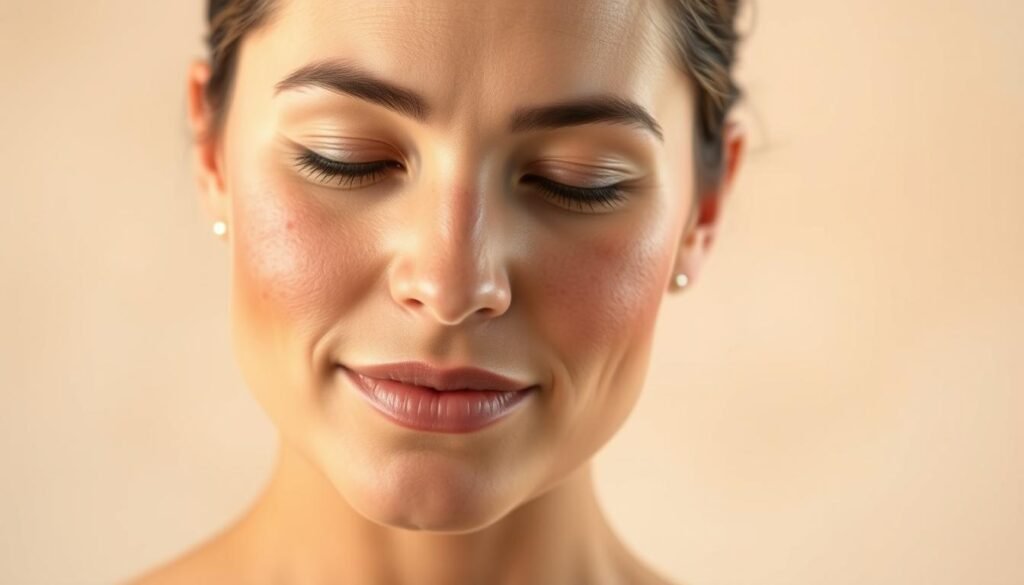Did you know over half of pregnant individuals get acne? This fact shows the common skin challenges expecting mothers face. Hormonal shifts, especially in the first and third trimesters, are mainly to blame. By learning about these changes, women can tackle skin issues better and find safe ways to handle them.
Key Takeaways
- Over 40% of pregnant women experience acne, especially in the first and third trimesters.
- Increased hormone levels are the primary cause of pregnancy acne.
- Topical treatments using benzoyl peroxide are generally considered safe during pregnancy.
- Good skincare practices can aid in managing acne during pregnancy.
- Understanding hormonal changes can help in effectively addressing skin issues.
- Many prescription acne treatments can pose risks to the developing fetus.
- Pregnancy acne often clears up a few weeks after delivery, providing relief for new mothers.
The Link Between Pregnancy Hormones and Acne
Pregnant women often see changes in their skin, such as acne, due to hormones. A big rise in hormones like progesterone during the first trimester affects the skin. This leads to more oil, which can make acne worse or cause new breakouts.
How Hormonal Changes Affect Skin
In early pregnancy, progesterone causes your skin to make more oil. This extra oil can clog pores and lead to acne. Morning sickness might also make things worse by causing vitamin shortages.
Some women’s skin gets better in the second trimester as hormones level out. But, hormone activity still has a big impact on skin health.
Increased Oil Production During Pregnancy
Late in pregnancy, there’s more estrogen, which changes the oil your skin makes. This can make your skin look better and less oily. As the pregnancy goes on, many women see less acne, especially when their blood volume increases, giving their skin a glow.
But, stress, what you eat, and your genes can still affect your acne. Dermatologists can give advice that’s safe for both mom and baby during this time.
Understanding Hormonal Imbalance
Hormonal changes can really affect your skin, especially when you’re pregnant. Changes in certain hormones can make acne worse. It’s important to know how this happens so you can take care of your skin better during this time.
Common Hormones Influencing Acne
Many hormones play a part in causing acne. For example, testosterone and similar hormones increase oil in the skin. This can block pores and cause zits. Other hormones like estrogen can help or hurt, depending on their levels.
During pregnancy, some women get more acne, while others get less. Hormones like estrogen keep skin healthy but can also make acne worse when they fluctuate. For more info on hormonal acne, check out this link.
Role of Androgens in Skin Health
Androgens, including testosterone, are big players in skin condition. They make the oil glands work more, which can cause acne. High levels of these hormones are often seen in PCOS.
Balancing these levels is key to reducing acne and keeping the skin healthy. Knowing about androgens helps in finding the right treatments for hormonal acne.
Timing of Acne Breakouts During Pregnancy
Expectant mothers need to know when acne might appear during pregnancy. Skin changes usually start around six weeks after getting pregnant. Because of hormone shifts, acne can get worse as the pregnancy goes on.
When to Expect Breakouts
Acne often shows up early in pregnancy, especially during the first few months. As the pregnancy moves forward, breakouts might get more frequent in the last trimester. This happens because of a rise in certain hormones, which makes the skin oilier.
Difference Between Trimesters
The three stages of pregnancy affect acne differently. The initial stages see a lot of changes in the skin. But, it’s the final stretch that might bring the most acne due to hormone spikes. The severity of these breakouts can also vary a lot from one woman to another.
Skin Changes and their Causes
During pregnancy, women see many skin changes because of hormone shifts. Key hormones like progesterone and estrogen have a big role. Knowing how they affect the skin can help tackle skin problems like acne at this time.
Impact of Progesterone Levels
Progesterone going up can change the skin in certain ways. It can make the skin thicker, which might block pores and lead to more acne. This hormone also makes more oil on the skin. This can cause breakouts, especially if you’ve had acne before. So, controlling Progesterone Effects is important for people with skin issues.
Effects of Estrogen Fluctuations
Estrogen is also key for skin health. Its levels going up and down can affect the skin in different ways. For some, more estrogen makes the skin feel better and less oily, which can mean less acne. But for others, it can make the skin uneven and cause problems like melasma. Knowing about Estrogen Impact helps in finding the right skin care during pregnancy.

Managing Acne Treatment during Pregnancy
Taking care of acne during pregnancy requires attention to safety for both mom and baby. Acne can get worse, especially in the first trimester. It’s important to choose treatments that won’t harm you or your baby.
Safe Over-the-Counter Products
There are safe over-the-counter options for acne. Benzoyl peroxide and azelaic acid are good choices because they work well and don’t go deep into the body. Try using products like Cetaphil Oil Removing Foam Wash and Neutrogena Hydro Boost Water Gel for gentle skin care.
Consulting with Healthcare Providers
Talking to a healthcare provider before starting any acne treatment is a must. This ensures you get a plan that fits your skin and pregnancy stage well. Pregnant individuals should stay away from harmful products like retinoids and some antibiotics.
Good skincare habits, knowing which products are safe, and getting advice from experts are key to managing acne when pregnant. For more information on treatment options, check out managing acne during pregnancy.
Topical Remedies for Pregnancy Acne
Managing acne when you’re pregnant can be hard. But, safe options like benzoyl peroxide and azelaic acid exist for expectant moms. These help keep the skin healthy without risking the baby’s safety.
Benzoyl Peroxide and Azelaic Acid
Benzoyl peroxide and azelaic acid are top picks for pregnancy acne. The American College of Obstetricians and Gynecologists (ACOG) says they’re safe. They fight inflammation and bacteria, helping to clear up acne.
But, it’s important to follow directions to avoid side effects. They’re especially good for acne on the chin and jawline.
Common Ingredients to Avoid
Some acne ingredients are bad for pregnancy. Avoid salicylic acid and topical retinoids, like tretinoin (Retin A®). Isotretinoin and hormone treatments can cause birth defects. Always read labels and talk to your doctor to stay safe.

| Ingredient | Safety During Pregnancy | Function |
|---|---|---|
| Benzoyl Peroxide | Safe | Reduces bacteria and inflammation |
| Azelaic Acid | Safe | Reduces inflammation and unclogs pores |
| Salicylic Acid | Avoid | Exfoliates and reduces inflammation |
| Topical Retinoids (e.g., Tretinoin) | Avoid | Regulates skin cell turnover |
By choosing safe ingredients, moms-to-be can tackle acne without risk to their babies. For tips on managing pregnancy acne, check out resources like this guide.
Natural Remedies for Acne Relief
Finding the right way to treat pregnancy acne can be tough. Natural remedies are key for better skin health. Using soft skin care routines keeps the skin moist. It avoids rough irritants. This is crucial during all pregnancy stages.
Benefits of Gentle Cleansing
A gentle cleanser is important for acne during pregnancy. It stops irritation and cleans the skin well. Natural ingredients like honey or coconut oil are great. They soothe and nourish the skin. Adding these to your skincare helps fight breakouts better.
Using Oils and Moisturizers Wisely
Picking the right oils and moisturizers is very important during pregnancy. Oils like tea tree help reduce acne because they fight inflammation. Also, moisturizers that don’t clog pores keep your skin moist. They ensure your skin stays soft and smooth. To learn more about hormones and acne, check out this resource.
Understanding Melasma and Hyperpigmentation
During pregnancy, many women see their skin change, especially with conditions like melasma and hyperpigmentation. These are mainly caused by shifts in hormones, such as increases in estrogen and progesterone levels. Knowing about these conditions and how to treat them can help women during this big life change.
Why Melasma Occurs in Pregnancy
Melasma is often called “the mask of pregnancy” because it often shows up at this time. About 50 to 70 percent of pregnant women might get it. If it runs in your family, you might be more likely to get melasma, especially if you have darker skin with more melanin, which makes pigmentation stronger.
Being in the sun can also cause melasma to develop. Pregnant women need to be very careful about sun protection. This means using sunscreen, wearing UV-blocking clothes, and wide-brimmed hats to keep their skin safe.
Preventative Measures and Treatments
To prevent melasma, women need to make some lifestyle and skincare changes. Eating a diet with less refined sugars and carbs can help. For those already seeing dark spots, safe remedies during pregnancy are vitamin C serums and azelaic acid. These treatments can make the skin brighter and control pigmentation.
After having the baby, treatments like chemical peels and laser therapy could be options if melasma stays around. Often, melasma will fade on its own, especially if you keep protecting your skin from the sun and take good care of it. After birth, treatments could include hydroquinone, retinoids, and various light treatments that help make the skin look better and reduce hyperpigmentation.

Conclusion
It’s crucial for expectant mothers to understand how hormonal changes affect acne. During pregnancy, up to 43% of women face acne issues. The rise in hormones like progesterone often causes more oil production and breakouts.
For managing acne, sticking to a gentle skincare routine is key. Use mild cleansers without fragrance twice a day and choose moisturizers that won’t clog pores. It’s also wise to talk to doctors about safe treatments, like azelaic acid or benzoyl peroxide.
Keeping hydrated and maintaining clean skin habits are important too. Changing towels and pillowcases often can help prevent acne. This is part of taking good care of your skin.
Self-care is very important during pregnancy. Having acne is common, but there are ways to handle it. By knowing about skin care and hormonal changes, women can navigate this special time with confidence.